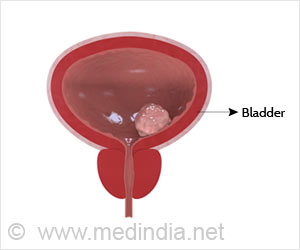A blood test detecting tiny amounts of circulating cancer DNA can identify the risk of cancer recurrence and guide precise treatment in bladder cancer following surgery.

‘Blood test method of determining circulating cancer DNA (ctDNA) presence in bladder cancer directs post-surgical treatment.’





The findings of the study reported in journal Nature show that particular cancer DNA marker in blood of patients with urothelial cancer following surgery to remove their tumour has a higher likelihood of cancer relapse. These patients also benefit from subsequent atezolizumab treatment.These remaining cancer cells left behind after tumor removal surgery are known as molecular residual disease (MRD), they increase the chances of a patient's cancer reoccurring as the cells can spread and establish tumors elsewhere in the body.
To identify patients with increased likelihood of MRD following surgery, a blood test detecting the presence or absence of circulating tumour DNA (ctDNA) - tumour-derived fragments of genetic material that can escape into the bloodstream is conducted.
Lead researcher, Tom Powles, Professor of Genitourinary Oncology at Queen Mary's Barts Cancer Institute and Director of Barts Cancer Centre at Barts Health NHS Trust, said: "These novel findings demonstrate ctDNA as a marker for residual disease and response to atezolizumab. These findings may change our understanding of post-surgical cancer care and, if validated in this setting as well as across tumour types, they may also change clinical practice”.
Personalised treatment based on the identification of MRD should be initiated to avoid cancer relapse and unnecessary exposure to other toxic drugs.
Advertisement
Advertisement














